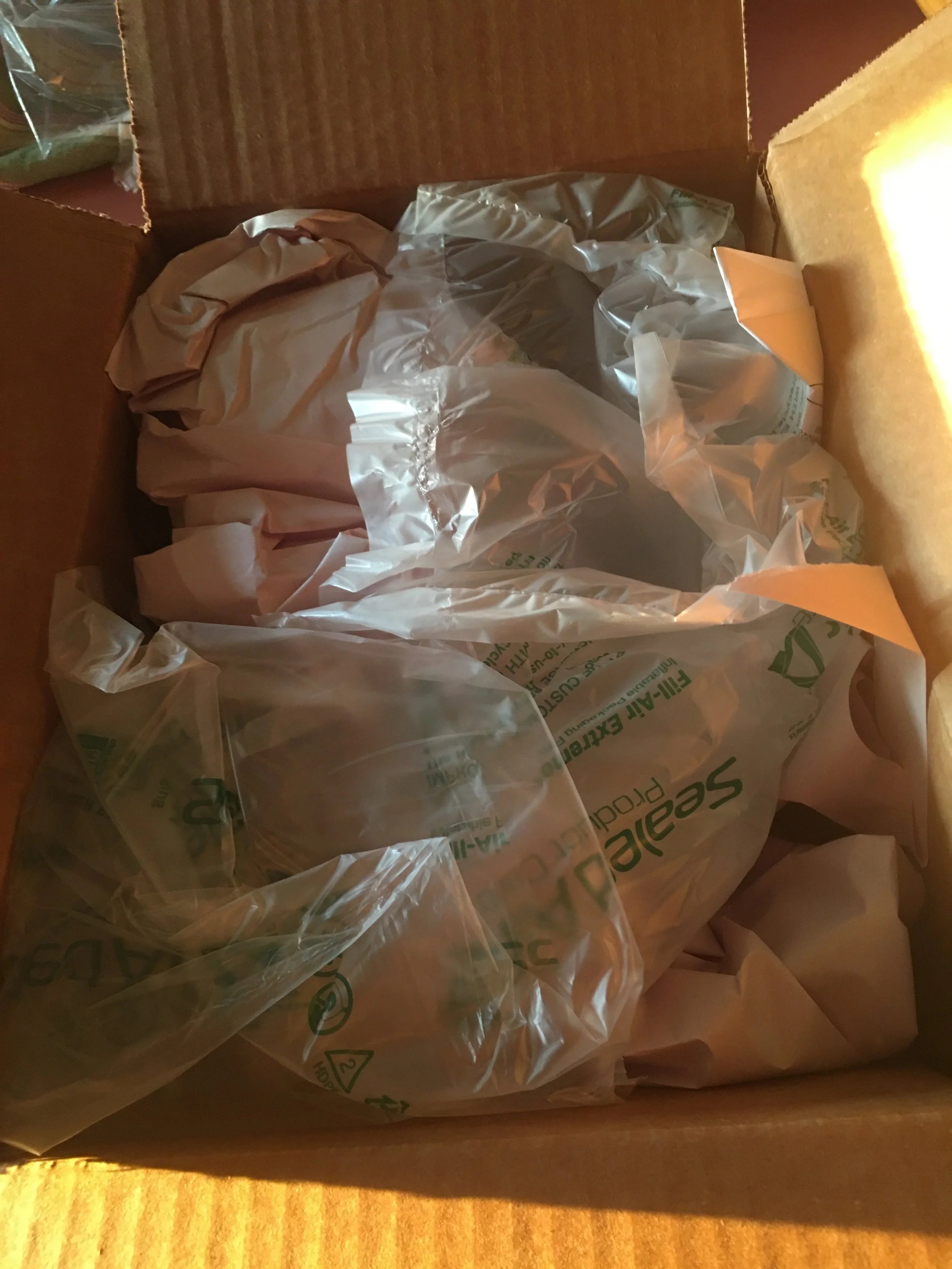The Climate Conference and Plastics
December 1, 2023 by Mary-Ellen Lovinsky
If you are like me, you may be getting packages in the mail that are filled not only with what I intentionally ordered but with unintentional plastic in the box to secure the contents in transit. I have started to send the plastic in the boxes they were packed in back to the companies with a note.
“Please consider replacing this package stuffing with something that I can recycle. Please find a sustainable renewable alternative.”
Of course, I included information about Sylvacurl in the box and add “You might consider this alternative!”
Most plastic air bags, film, bubble wrap, single use bags and shrink wrap cannot be recycled in Vermont. I looked it up recently https://dec.vermont.gov /waste-management/solid/materials-mgmt/recycling. According to the site only plastics marked with numbers 1 and 2 can be recycled and in Vermont that is mandatory. In fact Vermont outlawed the use of single use plastic bags in July 2020. The law, which went into effect on July 1, 2020, prohibits stores and food service establishments from providing single-use plastic carryout bags at the point of sale, expanded polystyrene (commonly called Styrofoam) food and beverage containers, plastic straws (except upon customer request), and plastic stirrers. I found out recently listening to a podcast that the plastics marked #1 and #2 are the only plastics that are being recycled. The others are not recycled and are marked as if they are. It is misleading to the public. The rest ends up in a landfill or maybe worse in our waterways and oceans.
There is a problem for me personally because I am getting plastic stuffing in packages from other places shipped to me to dispose of.
Is it a problem for you?
Recently, I listened to the radio podcast: How to Rid the World of Plastic Waste- https://one.npr.org/i/1210158809:1210158812. This podcast aired on November 2, 2023. I highly recommend listening to this NPR On Point show hosted by Meghna Chakrabarti. I am not the only person struggling to recycle plastics; this is a global issue.
One of the questions asked during the show was, “Does the government have a role to reduce the use of plastics to help lessen the amount of plastic waste?”
What do you think?
The podcast was also about the Climate Conference which is being hosted by The United Arab Emirates began yesterday on November 30,2023. This conference, one of many to address ways to adopt global sustainability goals around climate change. It runs until December 12. 2023. Members from the UN from around the globe will meet again to discuss issues that are facing us all. This conference hopes to work on keeping global warming to no more than 1.5 Celsius above pre industrial levels, increasing climate finance for developing countries and scale up investments in climate adaptation. One part of the podcast that I listened to addressed what we might do to begin to solve the growing crisis around plastic disposal. This year 2023 marks the midpoint on the United Nations (UN) 2030 Agenda for Sustainable Development. This is an ongoing initiative to make our planet a livable place in the future. We all need to make changes to help.
I learned that scientists are still developing plastics. In fact, it was noted by a panelist which included Dr. Charlotte Llyod MSC, PHD, University of Bristol, United Kingdom, Dr. Bethany Karney Elmore, a Swedish Chemist, and John Hocevar, the Oceans Campaign Director for Greenpeace that it’s not just the plastic product waste that is a problem, but also the following:
the use of non-renewable resources (petroleum) to make plastics
the use of plastics in agricultural film that leach into soils and need to be disposed of
micro plastics in the air that we breathe and the water we drink
According to Hocevar, there is no place left on earth that does not have plastic somewhere. Think about that. . . NO PLACE ON EARTH!
There are over 16,000 recipes for plastics today. Manufacturers have, “no obligation,” to disclose what the recipes and ingredients are. Toxic teas in our environment are causing illnesses and climate issues for all of us.
We need a stopping point! It’s time to start solving the problem that we are creating.
Okay, people say, there are some legitimate uses for plastics that we rely on, especially in the medical field. This was also spoken about by a guest named David Clement, North American Consumer Choice Center Director. Modern life may be reliant on plastics, but many are not necessary and those are the ones that we can begin to reduce. I learned that less toxic recipes for plastic can be developed to lessen the impact for those plastics that might be necessary for our modern world.
The Greenpeace goal is to phase out and eliminate plastic waste by 75% by 2040.
There are many questions being asked about the issues facing us. It is not just reducing plastic waste that needs to be addressed.
You can follow it yourself https://www.un.org/ Look for more information as this conference unfolds.
COP 28 Science Solutions, Solidarity for a Livable Planet
